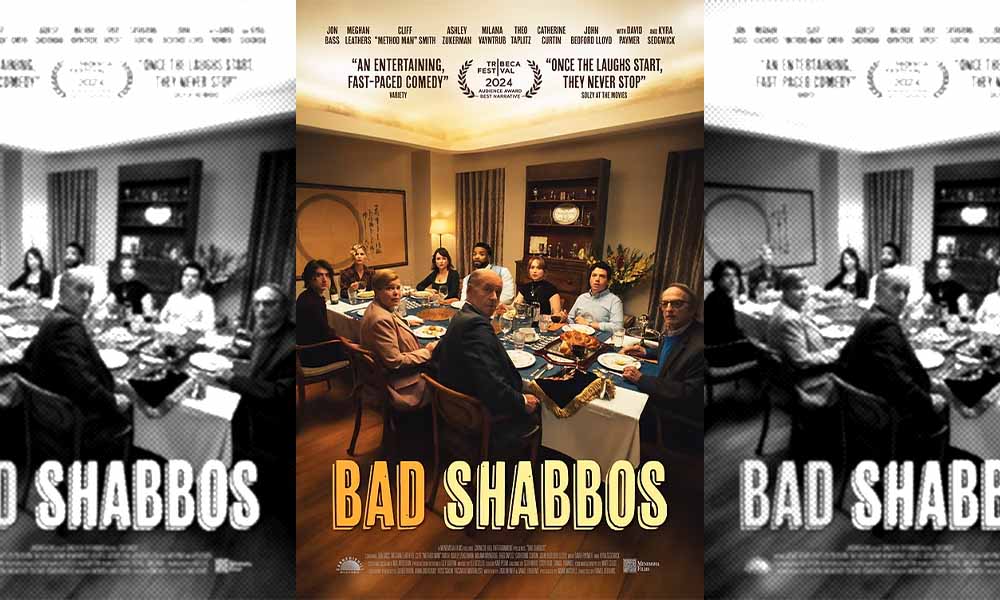Review | ‘Bad Shabbos’ Gets a Lot of Laughs Out of a Tried-and-True Scenario

It is a tried-and-true cinematic concept, because it is a universally common life event: meeting your significant other’s parents for the first time. Another such event, one that may stoke even more anxiety? When the parents all meet EACH OTHER. Parents will hopefully embrace their child’s chosen one, but in-laws? There are a lot of potential land mines there. Bad Shabbos, directed by Daniel Robbins, knows this all too well.
It’s Friday night, and David (Jon Bass) is bringing his fiancé Meg (Meghan Leathers) to Shabbos dinner at his parents’ Upper West Side apartment in Manhattan. (“Shabbos” of course is the Yiddish version of “Shabbat” and the term of choice for many New York and New Jersey Jews.) It’s not quite Guess Who’s Coming To Dinner? because they already know one another. The thing is, Meg isn’t Jewish…yet. She’s converting from Catholicism, but the special event of the night is that her Wisconsinite parents are coming too, meeting David’s parents for the first time. Along with David’s mom and dad (played terrifically by Kyra Sedgwick and character actor extraordinaire David Paymer) is her militaristic little incel brother, Adam (Theo Taplitz), and middle sister Abby (Milana Vayntrub). There’s also Ben (Succession’s Ashley Zukerman), Abby’s no-good boyfriend. Downstairs, at the building’s entrance, we have Jordan (Cliff “Method Man” Smith of the iconic New York hip-hop ensemble Wu-Tang Clan) as the affable door man.
It was already going to be a tense night, but the tension level goes through the roof after a shocking accident happens. What follows is a highly farcical comedy of manners…and body disposal.
Even without the big plot incident, Bad Shabbos is a rip-roaring comedy about family and cultural differences.
The film moves briskly, in and out at 84 minutes. It takes place almost in real time, the duration of the crazy events of the night. The laughs start coming nonstop. What I found interesting about the movie is that even if the big plot incident was taken out of it, it would still be a rip-roaring comedy about family and cultural differences. At certain points, the crisis at hand almost seems to detract from the family drama playing out in the forefront. It certainly raises the stakes of the night’s encounter, yet I would argue that the parents meeting for the first time has high enough stakes to begin with.
Meg’s dad (John Bedford Lloyd) is a stern, straightforward Green Bay Packers fan with a voice devoid of any type of accent. Her mom (Catherine Curtin) is almost uncomfortably nice, in an effort to both please everyone while keeping it all light at the same time. David notes at one point that, “They’re not used to families arguing,” like whatever tension there is gets buried beneath layers of custom niceties. Well, are Jewish families ordained to argue more? It’s a trope that’s good for laughs. Regardless, the movie suggests that people of all cultural backgrounds could stand to grow and be less rigid, even…gasp! us “chosen people.”
As the son of an interfaith marriage between a Jewish man raised on the Upper West Side of Manhattan and a Catholic woman from New Jersey, I had a feeling that I was going to relate to this movie a lot. Then, not even five minutes into the movie, they walk into Barney Greengrass, the famous Jewish deli only steps away from the apartment where my dad grew up. I knew I was in for something familiar, even if I had to watch it through my fingers, cringing with knowing laughter.


Fortunately for me, there was little religious tension in our interfaith family when I was growing up (at least to my knowledge), since my mother’s native New Jersey (which gets an obligatory dig in the film) was certainly not Wisconsin. But I could relate to it as an adult, with the father’s confidently booming voice alarmingly similar to that of my Missouri-born father-in-law. The sheer formality was also something to get used to.
Perhaps the highlight performance of the film comes from Cliff Smith, aka Method Man. While a terrific rapper and actor in his own right, the Staten Island-born icon may be unfamiliar to audiences over a certain age. He nearly steals the show with his physical presence, inherent likability and perfect sense of comedic timing. Like Meg’s parents, he’s not Jewish, but he’s also a door man on the Upper West Side and a native New Yorker. When crisis strikes, he knows what to do without making things worse. He lends the movie some much-needed counter-energy to the panicked neuroses in the apartment above. Anyone familiar with the rapper’s usual content and acting credits (The Wire, The Deuce) would know that when he shows up in a film, he is likely to be cast as the type of guy who can help you get rid of a body and be really chill about it. In this case, literally so.
Bad Shabbos offers a welcome opportunity for nonstop laughter, at a time when we could all really use it. It holds the mirror to many Jewish families in ways that both poke fun at but affirm the values of rituals, customs and our blood relations. What are all of these rituals for, anyway? They are a way to keep family close, in a world where forces threaten to pull those threads apart. I recommend seeing it with a crowd, as there will likely be a lot of people in the theater screeching with laughter alongside you, with an energy both commiserating and celebrating—essential components of Jewish humor.
